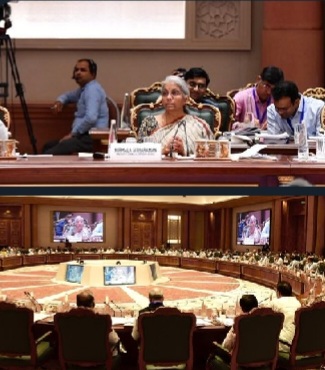Delhi Finance Meet: States Push for Higher Grants Amid Citizen Outcry on GST and Taxes...
SHIMLA/NEW DELHI: In a crucial pre-budget meeting held today in New Delhi Union Finance Minister Nirmala Sitharaman met with Finance Ministers from states and Union Territories to discuss the upcoming Union Budget 2024-25.
Notable figures such as Chief Ministers of Goa, Meghalaya, Mizoram, Nagaland, and Sikkim, and Deputy Chief Ministers from Bihar, Madhya Pradesh, Odisha, Rajasthan, and Telangana.
Himalayan states including Himachal are pushing for higher grants and special packages to cop up with the natural disasters and repairs and maintenance of the logistics and Infrastructure.
The farmers are demanding exemption from GST on pesticides, fertilizers, cartons and packaging products used by the apple industry.
They premised that the used cartons come back to industry for recycling and hence it is tax saving for the packaging industry.
State leaders voiced pressing concerns, demanding higher grants to counteract the diminishing value of money and high inflation and natural disasters and maintenance operational cost.
The cry for financial relief echoed in the public domain as well.
Citizens are urging for tangible support for the MSME sector, including reduced taxes and GST, easier access to bank loans, and the dismantling of monopolies by large traders in imports.
A glaring issue raised was the tight grip of big importers over trade, particularly on goods like poppy seeds, questioning why imports aren’t more democratized through multiple ports.
One of the hottest topics of the discussion was the exclusion of petrol and diesel from the GST ambit.
Citizens expressed their frustration over the inconsistent application of GST, demanding that fuels be brought under the same regime to ensure a unified tax structure.
The sentiment was clear: “If you talk about one tax for one country, why is everything not covered under it?”
Meanwhile, the GST Council’s plans to possibly reduce the tax on online gaming from 28% to 18% sparked further discontent.
Many argued that while gambling—a morally dubious activity—is considered for tax relief, essential services like medical insurance remain heavily taxed at 18%.
Calls for increased income tax exemption limits to ₹5 lakh and higher exemptions on medical insurance premiums to ₹1 lakh were loud and clear.
Citizens stressed that, with inflation soaring over 8% for the past decade, the real value of earnings has plummeted to nearly 40%, making it tough for the average taxpayer to cope.
As the middle class continues to bear the brunt of high taxes, there is growing resentment over the perceived inequity in tax policies.
Criticism is mounting over the taxation of temples and the lack of visible returns for taxpayers, fuelling a broader demand for the Ministry to deliver substantial relief and allow citizens more control over the allocation of their tax contributions.
With the budget formulation in full swing, today’s meeting underscored a critical juncture where the voices of states and citizens alike demand a fairer, more inclusive economic framework from the Central government.







